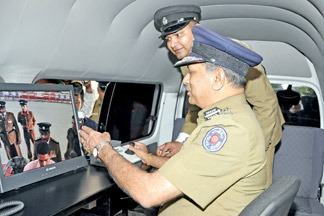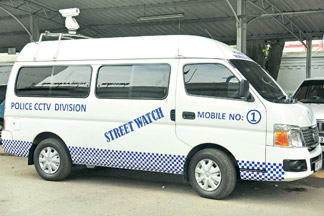|

Sri Lanka police adds Mobile CCTV:
Colombo City, safer now
By Jayampathy JAYASINGHE
 |
|
IGP N.K. Illangakoon launches the CCTV
mobile van by cutting the ribbon at Police Headquarters,
Colombo. |
 |
|
IGP N.K. Illangakoon monitoring the
CCTV panels inside the mobile van. Pix: Susantha
Wijegunesekera |
A mobile van equipped with sophisticated cameras and communication
equipment was launched to detect crime in the Colombo city and to keep a
tab on errant motorists who violate the highway code. Last week IGP N.K.
Illangakoon launched the mobile van at a ceremony held at the police
headquarters Colombo.
IGP Illangakoon told the media personnel that a mobile van with a
state of the art communication network and a digital camera will be
deployed in the Colombo city to track criminals and motorists who
violate the highway code. “We hope to expand this service to other areas
as well by deploying two more mobile vehicles in a months time,” he
said.
The Police Media Spokesman SP Ajith Rohana said crime prevention and
traffic management in the Colombo City stood high when compared to other
Asian cities. He attributed this to the setting up of a Close Circuit
Television (CCTV) system in the Colombo city. The first CCTV system was
launched in the Colombo city by Defence Secretary Gotabaya Rajapaksa on
December 29, 2010, he said.
Around 105 CCTV cameras have been installed at 28 key locations in
the city that affords protection to the people. The CCTV cameras
continuously monitor the activities of criminals and others who violate
traffic offences for 24 hours. The cameras also monitor the exit and
entrance points to the Colombo City.
The project has cost Rs. 227 million, according to police. SP Rohana
said the mobile van concept was an extension of the CCTV project which
was initiated in 2010.
The sophisticated cameras can view objects from a distance of 1.5
kilometres and number plates of vehicles from 150 metres away.
Those manning the control panels in the mobile vehicle can manoeuvre
the cameras in 32 directions to relay images and visuals to the main
command centre in Colombo for necessary action.
According to the Police Media Spokesman, the mobile CCTV becomes
invaluable during a riot or when there is a commotion in areas where
static CCTV cameras are not available to monitor such activity. The
mobile CCTV vehicle will also record and store visuals automatically.
SP Rohana said recorded footage are valid in a court of law under
section 14 of the Evidence Ordinance of 1995. These includes
photographs, voice recorded cassettes, photocopies, as evidence in
respect of civil and criminal cases. The newly launched Mobile CCTV can
be of immense help to answer distress calls of persons who arrive in the
Colombo City from distant places.
Plans are also afoot to expand the CCTV network to other major cities
in the provinces. “We have plans to set up more CCTV cameras in the city
of Colombo,”he said. The setting up of the CCTV cameras in the Colombo
City has helped detection of the following crimes from January to
December 2011.
(1)Solved three cases of grave crime.
(2)Providing technical assistance to police in respect of 25 criminal
investigations.
(3)Acting in consultations with the Police Emergency Unit to detect
3,447 cases of traffic offences.
(4)Helped police detect one fatal road accident and 622 cases of injury
caused to persons and damage caused to property.
(5)Helped police search 263 suspicious characters.
(6)Helped police identify nine wanted persons.
(7)Helped police search 80 suspected premises.
(8)Helped public recover two lost items.
(9)Help police supervise 1869 VVIP security arrangements.
(10)Helped monitor eight natural disasters.
(11)Helped police monitor 69 protest marches and rallies.
(12)Helped police monitor 214 religious processions including VVIP
funeral processions.
(13)Provided guidance and advice on three occasions.
The new addition was the brainchild of Senior DIG Gamini Navaratna
who proposed the concept of introducing a mobile CCTV vehicle to be
deployed in the city of Colombo. DIG W.F.U. Fernando at police
Headquarters Colombo provided logistical support to make the project a
reality.
 |
|
The newly launched CCTV
mobile van. |
The Close Circuit Television Division (CCTV) comes under the purview
of DIG Traffic, Western Province, Amarasiri Senaratne. ASP. T P. Gamlath
functions as the Director of the Close Circuit Television Division.
Chief Inspector A.M.P.P.D. Seneviratne functions as the OIC of the
Division while Chief Inspector Sarath de Silva functions as its
Co-Ordinating Officer. Chief lecturer of the Moratuwa University, B.S.
Amaraweera is the Consultant of the Police CCTV Division.
The concept of setting up CCTV cameras in the city will inculcate in
the minds of people to desist from committing crime as they will be
fearful of being watched by an electronic eye. The CCTV footage when
produced in a court of law, will be treated as admissible evidence to
support the crime. The CCTV is also intended to discipline motorists who
often violate the highway code and will help identify hit-and-run
motorists.
The CCTV cameras will be useful during natural disasters to locate
injured persons and to dispatch them to hospital without delay. The CCTV
cameras will help locate a sudden fire in a building and to inform the
Fire Department of the exact location. The system will help provide
security during VVIP movements.
|

